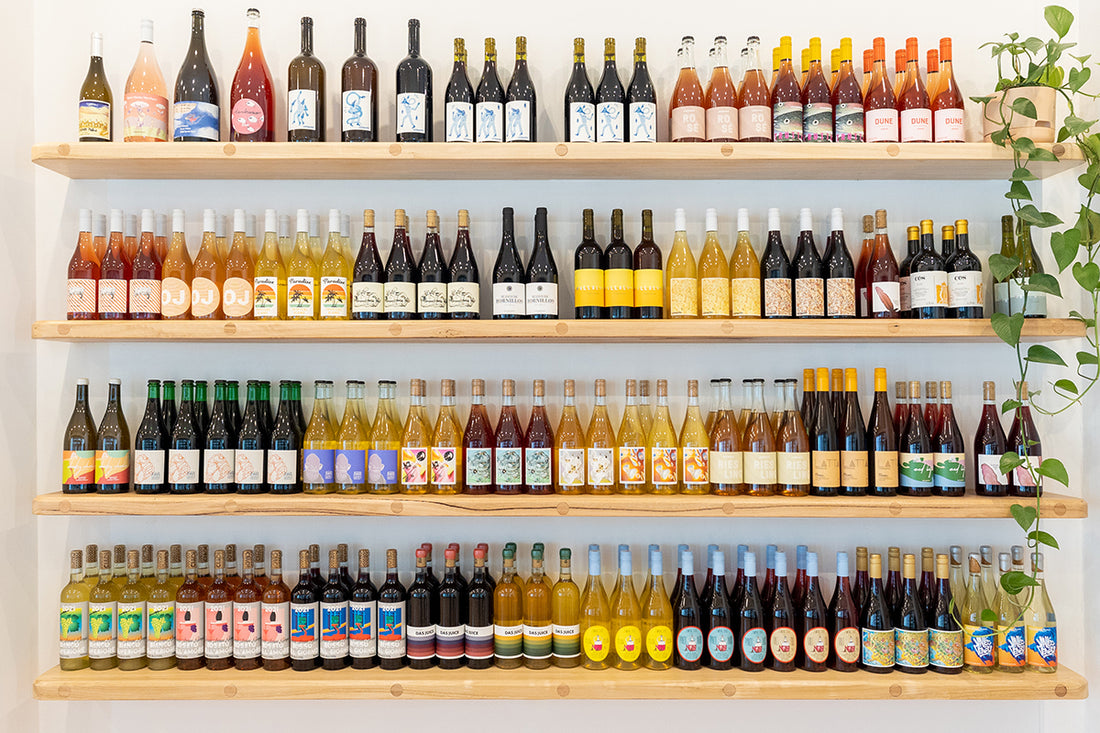
Natural Wine & Where to Find It
Florence DiffeyShare
If terms like lo-fi, orange, funky or hazy have been finding there way into your run-of-the-mill conversations, you might be curious about the elusive concept, natural wine. It’s the new normal to scan a wine list with a “not quite white” section or see a little marker indicating a wine is organic or biodynamic.
If you’ve been wondering what makes a wine natural, never fear. Consider this a guide to natty wine and where you can source one out in the wild, should your curiosity get the better of you.
What is natural wine? Trick question! Unlike France, in Australia there is no formal definition or certification of natural wine, so for today, here are my hot takes:
Let’s start with the basics. Wine is a product made from fermented grape juice, harvested from domesticated vines. This is an agricultural product, so just like apples or wheat, the closer you get to the provenance of the product the less handled or manipulated it will be.
Grapes that are picked by a machine in a giant vineyard where nothing else grows, and then trucked across the country to an industrial facility (winery) to be processed is not very natural. It becomes less of an agricultural product and more of a mass-produced commodity.
The vineyard. You can’t have natural wine without natural grapes and therefore a natural vineyard. While spraying synthetic chemical fertilisers, herbicides, fungicides and pesticides is still common practice commercially, quality producers recognise the importance of sustainable vineyard management and cultivating biodiversity. Some choose to farm organically, or biodynamically, or in drought-prone areas choosing to not irrigate may be the most sustainable option.
The winery. So much intervention takes place in the processing of grapes to make commercial wine, so the key here is minimal. Minimal intervention means doing as little as possible to get the wine to market. Minimising handling, fining, filtering, adding yeast or enzymes, adjusting acid or sugar, and particularly the addition of sulphur dioxide (SO2) – a widely used preservative agent. “No adds” is a concept some of the more extreme natural winemakers employ whereby nothing is added or taken away, even SO2.
So, what does that mean? Well, the generally accepted view is that the higher the quality of the grapes, the less you must do in the winery. The less you must hide or fix or mix or preserve. The phrase I’ve heard time and time again is “wine is made in the vineyard”. And by this token, all fine wine is natural wine. Once the grapes are harvested and placed in a vessel, they can more or less do the rest themselves. That is pretty natural.
Some producers make a choice to macerate white grapes on their skins, essentially making white wine like red wine. Depending on the variety, this can give an orange or pink hue but certainly does not distinguish a wine from being any more natural than another. However, its a very traditional method of winemaking in Italy, Slovenia and eastern Europe - a style commonly replicated in Australia. Natural wines come in all shapes, sizes and colours, and knowing where to get them is your guide to seeing what’s out there. There’s probably more than you think.
Six glasses to try in Newcastle
- Maison de Turps ‘L’Hypocrite’ Pet Nat at HUMBUG
- Year Wines Montepulciano d’Abruzzo Rosé at Bar Mellow
- Smallfry ‘Tangerine Dream’ Skin Contact Zibibbo+ at Scottie’s
- Casa d’Ambra Ischia Bianco at Harrison’s
- Unico Zelo ‘Fresh AF’ Chilled Red at Elementa
- Doom Juice Rouge at The Royal Oak
Most restaurants will have something on the wine list that fits under the banner of natural, whether they are seeking to or not. After all, when considering the finest wines in the world, most are farming with organic or biodynamic principals to maximise the vine health and in return the quality of the grapes at harvest. Most of said wines are made using as minimal intervention as possible in the winery to preserve the terroir – the upmost expression of the vineyard in the wine. It is that concept which underpins the differences in one row of vines to the next, as is the case in Burgundy. So, for those wanting to be more conservative in their choice of natural wine, you can always find a gem hiding in plain sight e.g. Agrapart et Fils ‘Terroirs’ Blanc de Blancs at Flotilla or Koehler-Ruprecht Kabinett Trocken Riesling 2020 at Âpé.
When in doubt, have a chat to us at Vera, and leave us a comment with your favourite "natty" wine.
